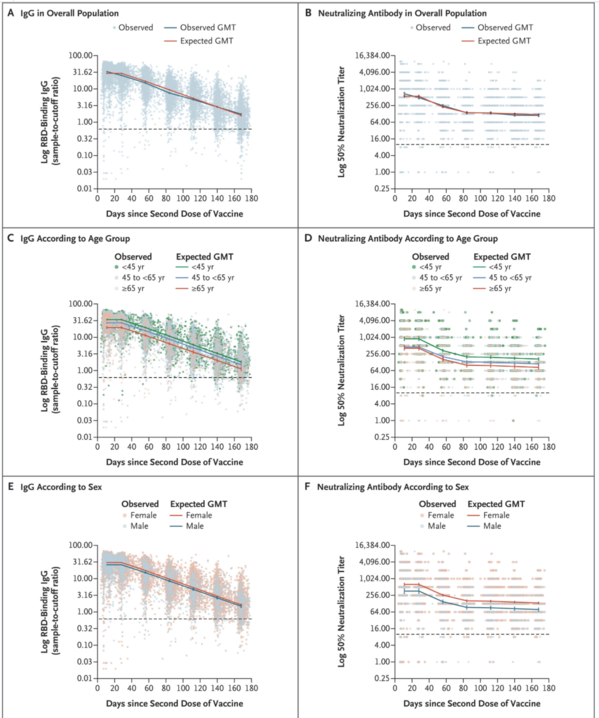Despite high vaccine coverage and effectiveness, the incidence of symptomatic infection with severe acute respiratory syndrome coronavirus 2 (SARS-CoV-2) has been increasing in Israel. Whether the increasing incidence of infection is due to waning immunity after the receipt of two doses of the BNT162b2 vaccine is unclear.
We conducted a 6-month longitudinal prospective study involving vaccinated health care workers who were tested monthly for the presence of anti-spike IgG and neutralizing antibodies. Linear mixed models were used to assess the dynamics of antibody levels and to determine predictors of antibody levels at 6 months.
The study included 4868 participants, with 3808 being included in the linear mixed-model analyses. The level of IgG antibodies decreased at a consistent rate, whereas the neutralizing antibody level decreased rapidly for the first 3 months with a relatively slow decrease thereafter. Although IgG antibody levels were highly correlated with neutralizing antibody titers (Spearman's rank correlation between 0.68 and 0.75), the regression relationship between the IgG and neutralizing antibody levels depended on the time since receipt of the second vaccine dose. Six months after receipt of the second dose, neutralizing antibody titers were substantially lower among men than among women (ratio of means, 0.64; 95% confidence interval [CI], 0.55 to 0.75), lower among persons 65 years of age or older than among those 18 to less than 45 years of age (ratio of means, 0.58; 95% CI, 0.48 to 0.70), and lower among participants with immunosuppression than among those without immunosuppression (ratio of means, 0.30; 95% CI, 0.20 to 0.46).
Six months after receipt of the second dose of the BNT162b2 vaccine, humoral response was substantially decreased, especially among men, among persons 65 years of age or older, and among persons with immunosuppression.
ワクチンの接種率や効果が高いにもかかわらず、SARS-CoV-2の症候性感染の発生率が増加している。感染率の増加が、BNT162b2ワクチンを2回接種した後の免疫力の低下によるものかどうかは不明である。
ワクチンを接種した医療従事者を対象に、抗スパイクIgG抗体と中和抗体の有無を毎月検査し、6か月間の縦断的前向き研究を行った。線形混合モデルを用いて、抗体レベルの動態を評価し、6ヵ月後の抗体レベルの予測因子を明らかにした。
本研究には4868名の参加者が含まれ、3808名が線形混合モデルによる解析の対象となった。IgG抗体は一定の割合で減少したが,中和抗体は最初の3カ月間は急激に減少し,その後は比較的緩やかに減少した。IgG抗体値は中和抗体価と高い相関性を示したが(スピアマン順位相関0.68~0.75)、IgG抗体値と中和抗体値の回帰関係は、2回目のワクチン接種後の時間に依存していた。2回目のワクチン接種から6ヵ月後の中和抗体価は,男性の方が女性よりも大幅に低かった(平均値の比、0.64;95%信頼区間[CI]、0.55~0.75)、65歳以上の人は18歳から45歳未満の人よりも低く(平均値の比、0.58;95%CI、0.48~0.70)、免疫抑制を受けている参加者は免疫抑制を受けていない参加者よりも低かった(平均値の比、0.30;95%CI、0.20~0.46)。
BNT162b2ワクチンの2回目の接種から6ヵ月後、液性反応は、特に男性、65歳以上の高齢者、および免疫抑制状態にある人で、大幅に低下していた。
Figure 2.Distribution of Antibodies 6 Months after Receipt of Second Dose of the BNT162b2 Vaccine.

https://www.nejm.org/doi/full/10.1056/NEJMoa2114583